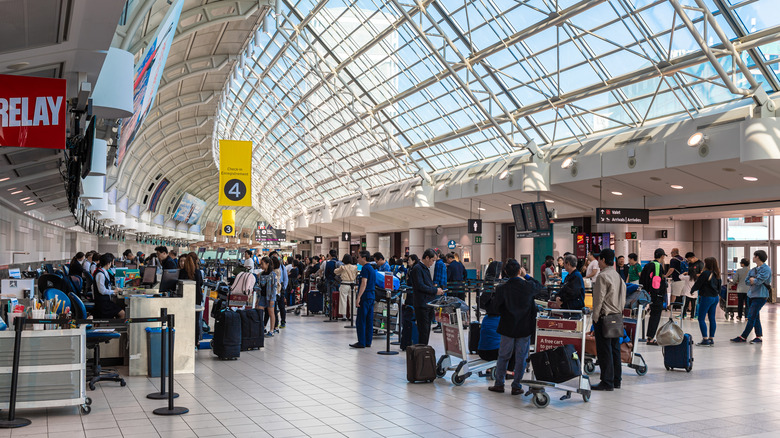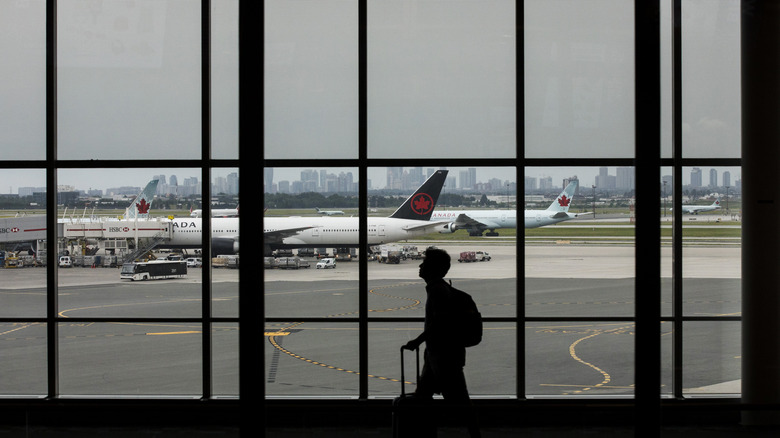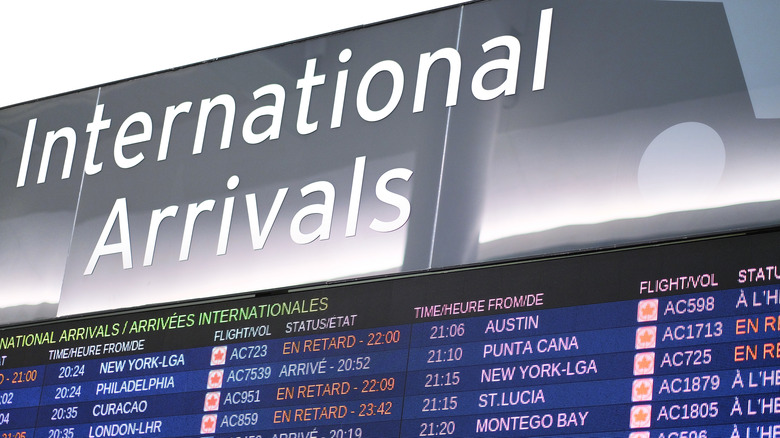This Canadian Airport Is Considered The Most Stressful In North America
Air travel can be inherently stressful — unpredictable weather patterns lead to frustrating delays, mechanical problems might ground flights unexpectedly, and human errors, from airline staff or passengers, can introduce a slew of complications. However, some airports manage these stressors better than others. According to recent data, Toronto Pearson International Airport (YYZ) holds the dubious honor of being considered the most stressful airport in North America.
Toronto Pearson is a well-known bustling hub: It's the second busiest international flight gateway in the Americas, overshadowed only by New York's JFK Airport. Additionally, it ranked 29th in the list of the world's busiest airports by passenger traffic — approximately 50 million passengers travel through every year. It's also Canada's largest airport, spanning 4,600 acres (think 12,500 hockey arenas!). It facilitated 50,000 jobs prior to the pandemic, handles 388,700 metric tonnes of cargo, and has on average 1,250 flights departing and arriving every single day. With such heavy footfall, efficient management becomes crucial to ensure smooth operations and positive traveler experiences.
However, a recent analysis conducted by the travel company Hawaiian Islands suggests that Toronto Pearson might be falling short in some areas. To conduct the research, they analyzed over 1,500 Google reviews for more than 500 airports worldwide. Using the TensiStrength analysis tool, airports were ranked based on the percentage of reviews that indicated stress. For YYZ, an overwhelming 76% of reviews did just that, setting it apart as the most stressful airport across North America. But what are the factors jet-fueling this stress?
What is happening at Toronto Pearson?
A deep dive into all the YYZ Google reviews averaging 3.6 stars sheds light on many travelers' grievances. Commonly cited phrases in negative feedback include "lost luggage," "immigration," "customs," and "embarrassment." The complaints encompass both operational aspects, such as long layovers or issues with delayed flights, and more personal experiences of travelers, such as feeling uncomfortable during customs or immigration checks. One traveler from Florida wrote, "Toronto's Pearson Airport is a special circle of hell. The worst airport experience ever," posting a picture of the departures board with more than 24 delayed flights (via X, formerly Twitter).
Further insights from the latest annual Airport Satisfaction Study by J.D. Power suggest that North American airports, in general, are facing some serious challenges. The study investigates six factors: terminal facilities, airport arrival and departure, security check, check-in and baggage check, baggage claim, and food, beverage, and retail. As a result, overall customer satisfaction ratings fell by 25 points, standing at 777 out of 1,000. "The combination of pent-up demand for air travel, the nationwide labor shortage, and steadily rising prices on everything from jet fuel to a bottle of water have created a scenario in which airports are extremely crowded, and passengers are increasingly frustrated," said Michael Taylor, travel intelligence lead at J.D. Power. Toronto Pearson, given its significant passenger load, is no exception to these challenges.
Delays, staffing shortages, and missed connections at YYZ
But it's not all grim for Toronto Pearson. Aware of the ongoing, complex obstacles of managing such a massive operation and working towards easing these pain points for travelers, Greater Toronto Airports Authority (GTAA) President and CEO Deborah Flint says, "The anxiety, the uncertainty, the frustration, and the lack of control that was felt by passengers ... is one that we will never forget," but now, "collectively, we are far more prepared" (via CP24).
Despite some improvements, a CBC report points out that delays and other issues remain a significant concern. Weather-induced delays, staffing shortages, and airlines notoriously overbooking flights are leading to a ripple effect of complications, from missed connections to extremely long tarmac waits. Jessica Ng of the Tourism Industry Association of Ontario (TIAO) explains to CBC: "Folks are deciding that, 'You know what? Based on what we're seeing, we're just not going to travel to Canada, to Ontario ... because it's seen as being too cumbersome.'" Beyond being a problem for travelers with layovers and frustrated Torontonians prepped for vacation, inbound tourism to Ontario has gone down a worrisome 24%.
While Toronto Pearson International Airport serves as a critical gateway connecting Canada to the rest of the world, its current status of infamy underscores the need for introspection and action. Addressing operational and infrastructural challenges head-on, while also focusing on enhancing travelers' experiences, will be pivotal in solving the "PR problem" of YYZ being the most stressful airport in the world.


